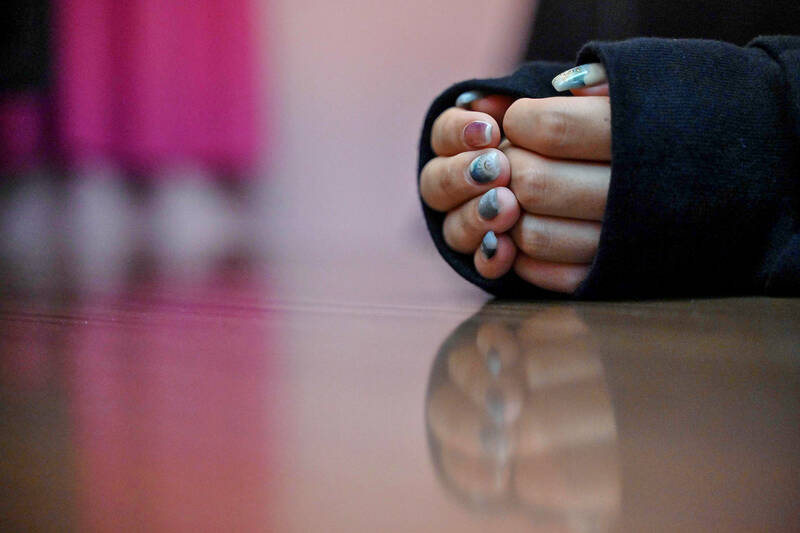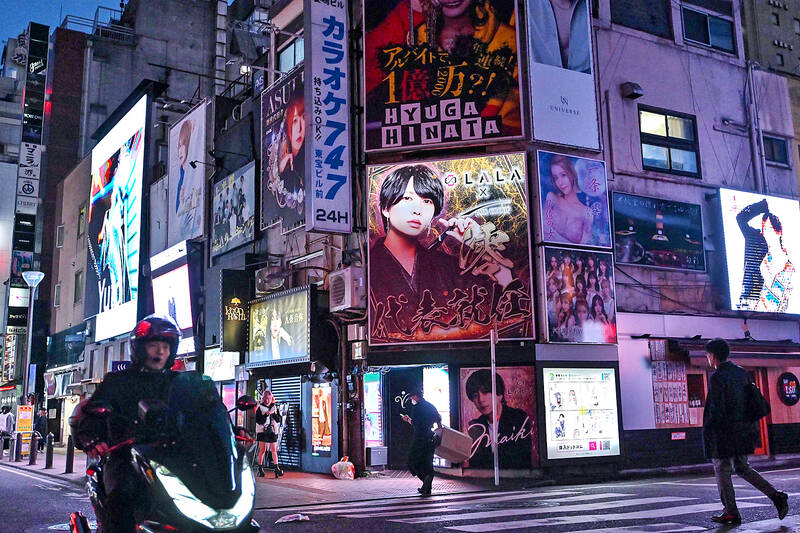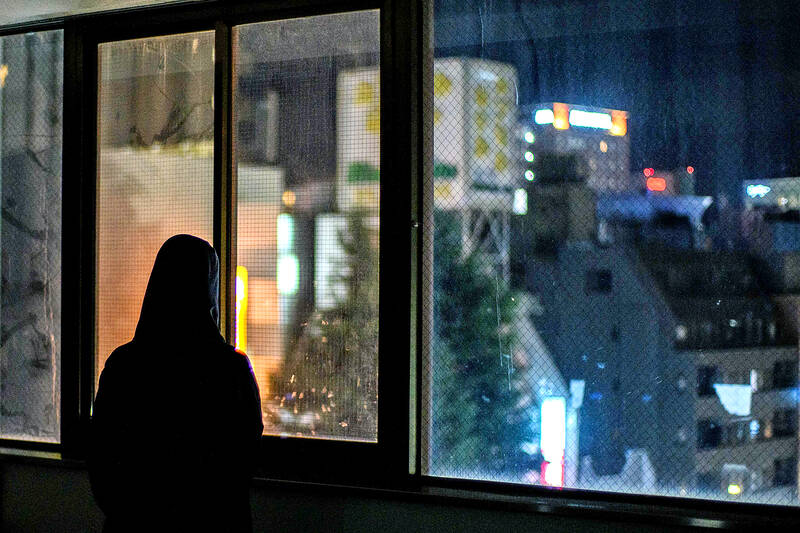Growing up, Mirai Kisaragi fled her abusive parents, survived homelessness and contemplated suicide. At 18, she met her “savior” at one of Tokyo’s hundreds of host clubs, where men entertain women.
Except he, too, was no good.
Before long, Kisaragi became one of a growing number of victims of financial and sexual exploitation linked to these establishments, which have dotted Japan’s red-light district Kabukicho for decades.

Photo: AFP
Just like in hostess clubs, where the clients are men, hosts spruced up with make-up and immaculate hairstyles regale female customers with sweet talk and expensive alcohol.
Lured by the promise of romance, women can find themselves tricked into abusive relationships, towering debt and even prostitution, activists say.
Kisaragi ended up in Kabukicho after running away from home at 14. There, she occasionally slept in emergency stairwells before she was sent to a care home. At 18, she met a “cool” attentive man who actually seemed to care — a host.

Photo: AFP
“Whenever I opened the door of the host club to see him, he would say ‘welcome home’ — something no one had ever said to me at home,” said Kisaragi, now 23.
But he installed her in one of Tokyo’s ubiquitous “net cafes,” where she was made to work as a prostitute, dispatched on demand.
He collected all her profits, and as she continued to visit the club, she piled up debts.

Photo: AFP
“What the host was really doing was to manage me as a prostitute. But I naively thought back then that he had given me a job and a smartphone on the spot,” she said.
“He looked like a saviour to me then.”
‘HUMAN TRAFFICKING’
Women like Kisaragi are drawn into clubs in different ways. Some are chatted up on Kabukicho’s streets, while others are persuaded by hosts they interact with on TikTok.
They can accumulate debts of hundreds of dollars a night ordering overpriced drinks, while hosts dangle everything from sex to assurances of love and marriage to manipulate them, activists say. Hosts sometimes even move in with women who are lonely or experiencing poverty and then browbeat them into sex work, in what resembles “domestic violence,” said Kazuna Kanajiri, head of Tokyo-based advocacy group PAPS.
“Young and poor women from single-parent families, for example, make the most lucrative targets for them,” she said.
Indebted women are sent to “scouts” to find jobs in the sex trade. The cash flow between hosts, scouts and sex businesses amounts to “straight-up human trafficking,” said Hidemori Gen, founder of a support group for parents. “’This woman must be worth 20 million yen’ (US$140,000). That’s the kind of thinking upon which host clubs exist,” he said.
Families have reported at least 250 cases to his group since July, an explosive rise from previous years that he attributes in part to the end of pandemic restrictions. Not all businesses are unscrupulous, and some say clients were already sex workers before getting entangled with hosts.
“I always warn girls about the price tag before they order drinks,” said Kabukicho host Saito, who only gave his last name. “So getting into debt is really their choice, but some still fail to pay, and I end up shouldering their debt,” the 27-year-old lamented.
‘I WANTED TO BE LOVED’
Still, the industry has begun soul-searching, with Prime Minister Fumio Kishida urging action and police conducting widespread raids on establishments. Host club operators in Kabukicho this month pledged to stop allowing clients to run up massive debts, and eradicate ties with the criminal underworld.
The industry “has undoubtedly been aware” of the problem, but “hasn’t taken it as seriously as we should have”, Takayuki Makita, head of major host club operator Group Dandy, told reporters last week.
“There is no way driving women into bankruptcy can ever be the right way for us to operate.”
Male customers can often incur massive bills at hostess clubs, but activists say they are not as vulnerable to the sexual exploitation for profit that women face with hosts.
One 20-year-old woman said she spent over 10 million yen (US$70,000) in two years on hosts, and ended up in sex work to pay down debts.
She was in institutional care from infancy, she said, with little memory of her parents.
“I wanted to be loved,” she said, speaking on condition of anonymity. “I thought that if my host hated me, life would no longer be worth living.” Now a member of PAPS, Kisaragi does outreach work in Kabukicho and sees her teenage self in many girls she encounters there.
“Kabukicho is a town where committing suicide can be treated as some kind of heroic act,” she says. “I’m talking to them thinking, ‘You don’t have to die’. I want them to live.”

In the March 9 edition of the Taipei Times a piece by Ninon Godefroy ran with the headine “The quiet, gentle rhythm of Taiwan.” It started with the line “Taiwan is a small, humble place. There is no Eiffel Tower, no pyramids — no singular attraction that draws the world’s attention.” I laughed out loud at that. This was out of no disrespect for the author or the piece, which made some interesting analogies and good points about how both Din Tai Fung’s and Taiwan Semiconductor Manufacturing Co’s (TSMC, 台積電) meticulous attention to detail and quality are not quite up to

April 21 to April 27 Hsieh Er’s (謝娥) political fortunes were rising fast after she got out of jail and joined the Chinese Nationalist Party (KMT) in December 1945. Not only did she hold key positions in various committees, she was elected the only woman on the Taipei City Council and headed to Nanjing in 1946 as the sole Taiwanese female representative to the National Constituent Assembly. With the support of first lady Soong May-ling (宋美齡), she started the Taipei Women’s Association and Taiwan Provincial Women’s Association, where she

Chinese Nationalist Party (KMT) Chairman Eric Chu (朱立倫) hatched a bold plan to charge forward and seize the initiative when he held a protest in front of the Taipei City Prosecutors’ Office. Though risky, because illegal, its success would help tackle at least six problems facing both himself and the KMT. What he did not see coming was Taipei Mayor Chiang Wan-an (將萬安) tripping him up out of the gate. In spite of Chu being the most consequential and successful KMT chairman since the early 2010s — arguably saving the party from financial ruin and restoring its electoral viability —

It is one of the more remarkable facts of Taiwan history that it was never occupied or claimed by any of the numerous kingdoms of southern China — Han or otherwise — that lay just across the water from it. None of their brilliant ministers ever discovered that Taiwan was a “core interest” of the state whose annexation was “inevitable.” As Paul Kua notes in an excellent monograph laying out how the Portuguese gave Taiwan the name “Formosa,” the first Europeans to express an interest in occupying Taiwan were the Spanish. Tonio Andrade in his seminal work, How Taiwan Became Chinese,